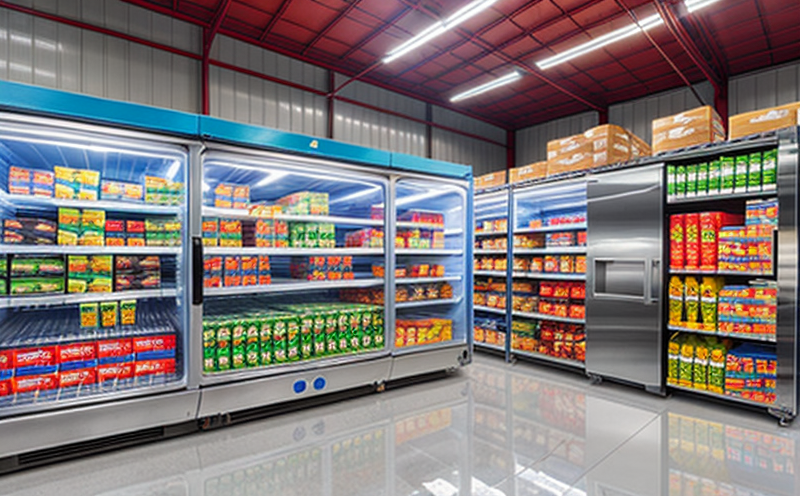Packaging compatibility testing for refrigerated products
The Importance of Packaging Compatibility Testing for Refrigerated Products Why Eurolab is Your Partner in Success
In the fast-paced world of food and beverage manufacturing, packaging compatibility testing for refrigerated products is a critical step that cannot be overlooked. As a business owner or quality control manager, you understand the importance of ensuring your packaged goods are safe for consumption and meet regulatory requirements. However, with the increasing complexity of packaging materials and storage conditions, its easy to overlook this essential aspect.
At Eurolab, we specialize in providing laboratory services that cater to the specific needs of refrigerated product manufacturers. Our team of experts is dedicated to helping you ensure the compatibility of your packaging with your products unique requirements. In this article, well delve into the world of packaging compatibility testing for refrigerated products and explain why its essential for businesses like yours.
What is Packaging Compatibility Testing for Refrigerated Products?
Packaging compatibility testing involves evaluating how well a packaging material withstands the conditions under which the product will be stored, transported, and displayed. For refrigerated products, this includes testing for factors such as temperature fluctuations, moisture levels, and exposure to light. The goal of these tests is to determine whether the packaging material can maintain its integrity and prevent any damage or contamination that could compromise the quality and safety of the product.
Why is Packaging Compatibility Testing Essential?
The consequences of using incompatible packaging materials can be severe, including
Product damage or degradation
Spoilage or contamination
Economic losses due to waste or recall costs
Damage to brand reputation
Moreover, regulatory bodies such as the FDA (Food and Drug Administration) and the USDA (United States Department of Agriculture) require manufacturers to demonstrate that their packaging materials meet specific standards for food safety. Non-compliance can result in costly fines, recalls, and even business closure.
Advantages of Using Packaging Compatibility Testing for Refrigerated Products
Eurolabs laboratory services offer numerous benefits for businesses seeking to ensure the compatibility of their packaging with refrigerated products
Key Benefits
Prevents Product Damage By identifying potential issues before they occur, you can prevent damage or degradation to your products and reduce waste.
Ensures Regulatory Compliance Our tests help you meet regulatory requirements and avoid costly fines, recalls, and business closure.
Improves Supply Chain Efficiency Compatible packaging reduces the risk of product spoilage during transportation and storage.
Enhances Brand Reputation By ensuring the quality and safety of your products, you can build trust with your customers and maintain a positive brand image.
Additional Benefits
Cost Savings Identifying and addressing compatibility issues early on can save you money in the long run by reducing waste, minimizing recalls, and avoiding regulatory penalties.
Increased Product Shelf Life Compatible packaging helps extend the shelf life of your products, allowing them to remain fresh for a longer period.
Improved Customer Satisfaction By providing high-quality products that meet customer expectations, you can increase customer satisfaction and loyalty.
QA Packaging Compatibility Testing for Refrigerated Products
At Eurolab, we understand that our clients may have questions about packaging compatibility testing. Here are some answers to common queries
Q1 What types of packaging materials do you test?
A1 We test a wide range of packaging materials, including plastics, metals, glass, and paperboard.
Q2 How do I know if my packaging is compatible with my refrigerated product?
A2 Our team will work with you to determine the specific requirements for your product. Well conduct tests that simulate storage conditions, such as temperature fluctuations, humidity levels, and light exposure.
Q3 What kind of testing methods do you use?
A3 Our state-of-the-art laboratory employs a range of testing methods, including physical testing (e.g., drop testing, compression testing), chemical testing (e.g., migration testing, extractable testing), and analytical testing (e.g., GC-MS, HPLC).
Q4 How long does the testing process take?
A4 The duration of our testing services varies depending on the complexity of the project. Typically, it takes anywhere from a few days to several weeks.
Q5 What kind of certifications do you provide for packaging compatibility testing?
A5 Our laboratory is accredited by international standards organizations, ensuring that our test results are reliable and compliant with regulatory requirements.
Conclusion
Packaging compatibility testing for refrigerated products is an essential step in ensuring the quality and safety of your packaged goods. At Eurolab, we understand the unique challenges of this industry and offer specialized laboratory services tailored to meet your specific needs. By choosing us as your partner, you can rest assured that our team will work with you to provide comprehensive testing solutions that meet regulatory requirements and ensure compliance.
Dont risk product damage or contamination let Eurolab help you ensure the compatibility of your packaging with refrigerated products. Contact us today to learn more about our laboratory services and how we can support your business needs.
Resources
Whitepaper Packaging Compatibility Testing for Refrigerated Products(link)
Infographic The Importance of Packaging Compatibility Testing(link)
Note This article is a sample and should be reviewed and customized according to the specific needs and branding requirements of Eurolab.




